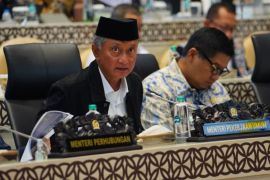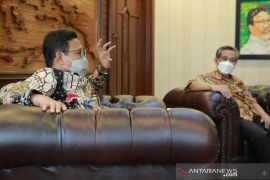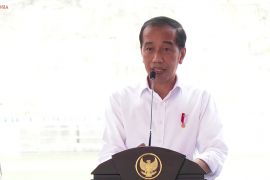"The pandemic has brought economic uncertainty. We have also learned that expediting vaccination is one of the keys to curbing the number of cases," BFK Head Febrio Kacaribu stated here on Wednesday.
Disparities in COVID-19 handling, the speed of vaccination, and the support of economic stimulus are causal to uneven economic recovery.
Many developing nations experienced a decline in their economic projections on account of stricter restrictions being imposed amid the spread of the Delta variant, Kacaribu pointed out.
Related news: Tourism Minister urges students to help revive economy
Several countries whose economies are projected to continue on a downward trajectory were India, at three percent lower than the original forecast; Malaysia, down 1.8 percent from the initial projection; the Philippines, down 1.5 percent; and Thailand, 0.5 percent lower than the initial projection.
Meanwhile, the IMF has projected Indonesia's economy in 2021 to decline by 0.4 percent to 3.9 percent, from the previous 4.3 percent.
On the other hand, economic projections of developed nations improved, as they re-opened with high vaccination coverage and massive stimulus.
For instance, the US economy grew 0.6 percent from the projected figure, the Euro zone was up 0.2 percent from the initial projection, and South Korea’s economy advanced 0.7 percent from the original projection.
Related news: Official projects continued growth in vaccine supplies in 4th quarter
He noted that at the global level, especially world leaders at the G20 forum had channeled all their resources to overcome the new wave of COVID-19 due to the Delta variant.
Leaders of developed countries ensured equal vaccine distribution among their people. They also secured funds to provide stimulus to the health sector and for social protection, according to Kacaribu.
"Indonesia has targeted to push its daily vaccination numbers to 1.5 million doses. We will gradually increase the number," he noted.
As of July 27, the Indonesian government had sent out 63.94 million vaccine doses to the public.
The government has ensured the availability of vaccine stocks to expedite vaccination. The government had also extended the public activity restrictions (PPKM) level 4 until August 2 in a bid to better handle the pandemic, and as a consequence, the daily count of cases had continued to decline.
He believes that by tightening policies and going the extra mile in the health sector, Indonesia can tackle the pandemic in order to facilitate economic recovery.
"We are also streamlining our state budget to provide more social aid and support for SMEs accompanied by efforts to accelerate the distribution," he said.
Related news: BI implements Bantuan Pintar to assist pandemic-affected MSMEs
Related news: Peruri-printed Peruvian banknotes, gateway to plethora of cooperation
Translator: Astrid H, Resinta Sulistiyanda
Editor: Fardah Assegaf
Copyright © ANTARA 2021












